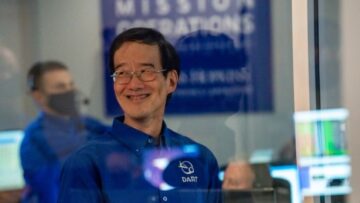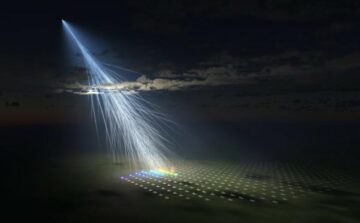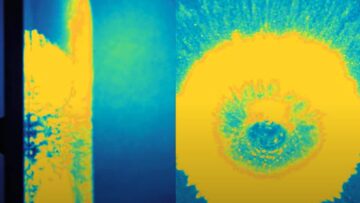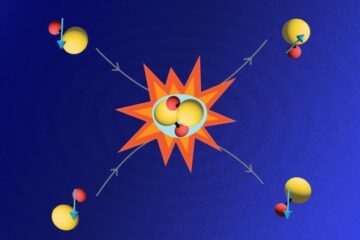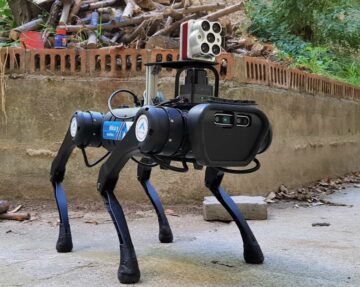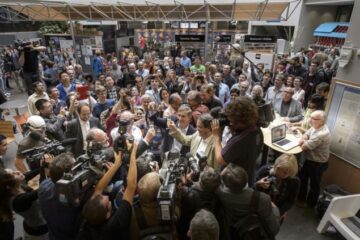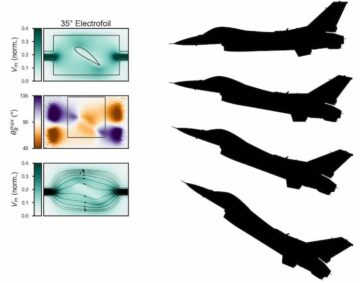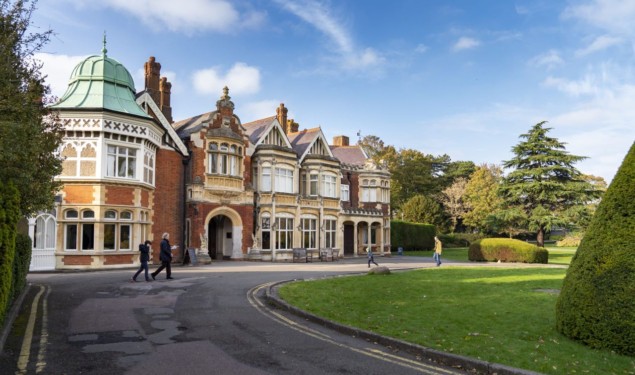
Today and tomorrow, a mansion on London’s leafy outskirts is, for the second time in its history, the focus of a global endeavour to deploy technological advances for global security. Where Alan Turing and his team of code breakers once struggled to defeat fascism during the Second World War, Bletchley Park is now hosting the world’s first major AI Safety Summit.
The need for international accord could scarcely be more obvious. At times of war and conflict, as the old proverb goes, a lie can travel halfway around the world while the truth is still putting on its shoes. But now it isn’t just a lie. Misinformation may be complex – deep fakes and the manipulation of images and data carry live risks. We worry if we have opened our own equivalent of Pandora’s box.
But there is so much more than politics at stake. AI brings with it many potential benefits for humanity. It could help us deliver healthcare and improved agriculture, understand climate change and enhance our cities. It could be a power to a better and more prosperous society, although we ask how and for who this might all work.
A changed world
There are now very few of us who haven’t tried to use one AI app or another and been shocked by how it responds to the task we set it. Most of us have also heard about how it may take jobs away from people and wonder if will be our role that is gone with the wind of AI.
This is not the first new technology to be greeted with a mix of celebration and fear. Physics-powered technologies have driven successive economic revolutions – mechanical, electrical, atomic – which have brought great opportunity and prosperity, but also significant risks, change and disruption, some of which I have experienced first-hand.
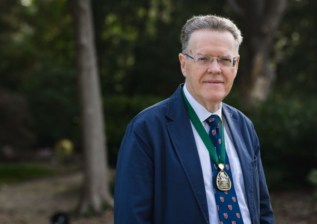
The phenomenon of AI is rightly exercising the minds of scientists and non-scientists alike. In the US, Fei-Fei Li – a computer scientist at Stanford University who is sometimes called “the godmother of AI” – has long championed human-centred computing and the use of AI for public benefit. Here in the UK, the Ada Lovelace Institute is working with industry, public institutions and academia to ensure the ethical implications of AI are properly considered.
But physicists have a special contribution to make to this moment of change. For while AI is grounded in computer science, physics has been central to its development and application. For decades, physicists have been at the vanguard of using AI: to improve models and make discoveries – often in very sensitive areas, from defence, to materials science, to nuclear fission and fusion.
So, physicists have real-world experience of some of the crucial questions the summit is considering. It’s all very well talking about algorithmic transparency, explicability and bias in the abstract, but when that algorithm is helping you design a fusion reactor, it focuses minds.
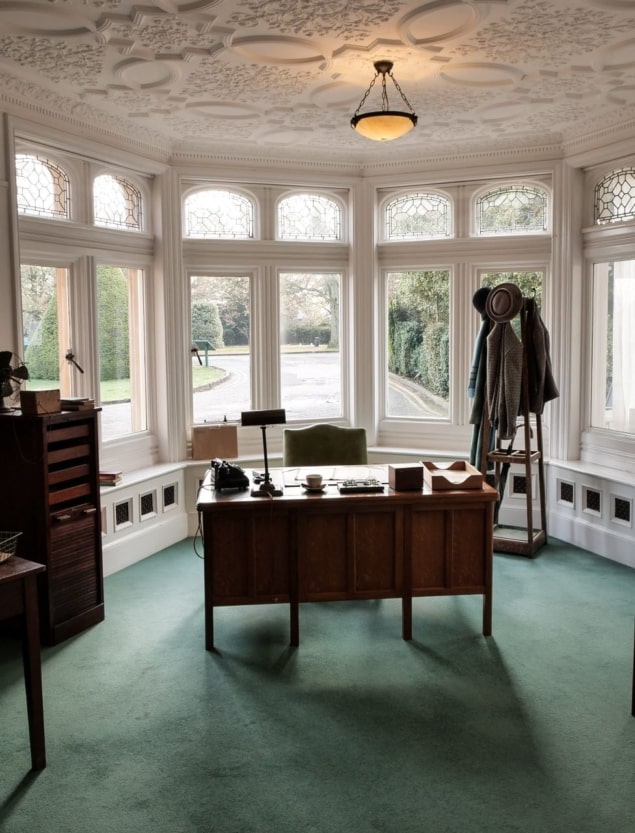
A tool with enormous potential
In a recent survey of 2086 adults in the UK, the polling firm YouGov found that 74% felt that “preventing AI from quickly reaching superhuman capabilities” was an important goal of AI policy, with only 13% disagreeing. But the fears and biases associated with AI often lie in what we as human beings have provided as the sources of information to be amplified, and the dilemmas about its application have as much to do with the political or commercial instincts of humanity as with technological change.
The truth is that AI amplifies possibilities and speeds processes for good and ill. It anticipates based on what it knows of what has gone before, and so now we are faced with both the potential for enormous good, or to replicate our own social failings at previously unimaginable speed and scale.
How we think we might help is for the physics community in all its expertise and diversity to come together, putting political, financial or national interests aside to create change that is good for all. But we also want to listen and learn as the questions and possibilities change. This year at the Institute of Physics, we’re preparing to embark on a new “impact project”, working with our membership and the wider community to explore the opportunities and risks of AI in a physics context – to explore cross-domain opportunities, support policymakers and ultimately leverage this technology for positive impact.
What next?
The path ahead is uncertain, to say the least. What should one do when we know too little about what the impact will be? How should we respond to the changes ahead? We need to focus on our children and the world they can build with the new technology. And we need to ensure each of them, regardless of background, has access to it.
I do think as many people as possible need to see how the latest technology will affect their lives and so I believe giving access to the new techniques to as many of our citizens as possible is crucial. We have by no means settled on what or who will be the winner in this race, but the clear danger is that it becomes a domain for those who can afford it. Only if we make this new technology available to the widest range of people, along with any training that is needed, will we give the best AI future to our children.

The Turing Test 2.0
Bletchley was a place where experts helped win a war. Our aim is to help secure the peace and benefits for all. We hope the big technology companies and politicians who will be in Bletchley, and those who will pick up the hard work of development once the politicians return to their desks, plan on doing the same. We are ready to play our part in a technological revolution that is bound to impact all of our lives.
- SEO Powered Content & PR Distribution. Get Amplified Today.
- PlatoData.Network Vertical Generative Ai. Empower Yourself. Access Here.
- PlatoAiStream. Web3 Intelligence. Knowledge Amplified. Access Here.
- PlatoESG. Carbon, CleanTech, Energy, Environment, Solar, Waste Management. Access Here.
- PlatoHealth. Biotech and Clinical Trials Intelligence. Access Here.
- Source: https://physicsworld.com/a/what-role-should-physicists-play-in-ai-safety/
- :has
- :is
- :not
- :where
- $UP
- 160
- 224
- 90
- a
- About
- ABSTRACT
- Academia
- access
- accord
- adults
- advances
- affect
- afford
- agriculture
- ahead
- AI
- aim
- Alan
- Alan Turing
- algorithm
- algorithmic
- alike
- All
- along
- also
- Although
- Amplified
- amplifies
- an
- and
- Another
- anticipates
- any
- app
- Application
- ARE
- areas
- around
- artificial
- artificial intelligence
- AS
- aside
- ask
- associated
- At
- available
- away
- background
- based
- BE
- becomes
- been
- before
- beings
- believe
- benefit
- benefits
- BEST
- Better
- bias
- biases
- Big
- Blue
- Blue Sky
- both
- bound
- Box
- Brings
- British
- brought
- build
- Building
- but
- by
- called
- CAN
- carry
- Celebration
- central
- Chair
- championed
- change
- changed
- Changes
- Children
- Cities
- Citizens
- clear
- click
- Climate
- Climate change
- code
- Codes
- come
- commercial
- communicate
- community
- Companies
- complex
- computer
- computer science
- computing
- conflict
- considered
- considering
- context
- contribution
- could
- cracked
- create
- crucial
- cryptography
- DANGER
- data
- decades
- deep
- Deep Fakes
- defence
- deliver
- deploy
- Design
- desk
- Desks
- Development
- dilemmas
- Disruption
- Diversity
- do
- doing
- domain
- driven
- during
- each
- Early
- Economic
- effort
- embark
- enhance
- enormous
- ensure
- Equivalent
- ethical
- experience
- experienced
- expertise
- experts
- explore
- faced
- fear
- fears
- felt
- few
- financial
- Firm
- First
- Focus
- focuses
- For
- found
- from
- fusion
- future
- Germany
- Give
- Giving
- Global
- goal
- Goes
- gone
- good
- great
- greeted
- halfway
- Hard
- hard work
- Have
- healthcare
- heard
- help
- helped
- helping
- here
- his
- history
- hope
- hosting
- How
- HTTPS
- human
- human intelligence
- Humanity
- i
- if
- image
- images
- Impact
- implications
- important
- improve
- improved
- in
- industry
- information
- Institute
- institutions
- Intelligence
- interests
- International
- issue
- IT
- ITS
- Jobs
- jpg
- just
- keith
- Know
- knows
- latest
- LEARN
- least
- Leverage
- lie
- little
- live
- Lives
- Long
- major
- make
- maker
- managed
- Manipulation
- mansion
- many
- many people
- materials
- max-width
- May..
- means
- mechanical
- membership
- might
- minds
- Misinformation
- mix
- models
- moment
- more
- most
- much
- National
- nazi
- Need
- needed
- New
- next
- no
- now
- nuclear
- obvious
- of
- Office
- Officer
- often
- Old
- on
- once
- ONE
- only
- open
- opened
- opportunities
- Opportunity
- or
- our
- own
- Park
- part
- path
- peace
- People
- phenomenon
- photo
- Physics
- Physics World
- pick
- Place
- plan
- plato
- Plato Data Intelligence
- PlatoData
- Play
- policy
- policymakers
- political
- Politicians
- politics
- positive
- possibilities
- possible
- potential
- power
- preparing
- president
- previously
- processes
- properly
- prosperity
- prosperous
- proverb
- provided
- public
- Putting
- Questions
- quickly
- Race
- range
- reaching
- reactor
- ready
- real world
- recent
- Regardless
- Respond
- return
- Revolution
- risks
- Role
- s
- Safety
- same
- say
- Scale
- Science
- Scientist
- scientists
- Second
- Second world war
- Secret
- secure
- security
- see
- sensitive
- set
- Settled
- shocked
- should
- significant
- site
- sky
- So
- Social
- Society
- some
- sometimes
- Sources
- special
- speed
- speeds
- stake
- stanford
- Stanford university
- Still
- Summit
- superhuman
- support
- Take
- talking
- Task
- team
- techniques
- technological
- Technologies
- Technology
- technology companies
- test
- than
- that
- The
- the UK
- the world
- their
- Them
- There.
- they
- Think
- this
- this week
- this year
- those
- thumbnail
- time
- times
- to
- together
- tomorrow
- too
- tool
- Training
- Transparency
- travel
- tried
- true
- Trust
- truth
- turing
- turing test
- Uk
- Ultimately
- Uncertain
- under
- understand
- unimaginable
- university
- us
- use
- used
- using
- Vanguard
- Versus
- very
- want
- war
- was
- we
- week
- WELL
- What
- when
- which
- while
- WHO
- wider
- Wider Community
- will
- win
- wind
- windows
- winner
- with
- wonder
- wooden
- Work
- working
- world
- world’s
- worry
- year
- years
- you
- zephyrnet

